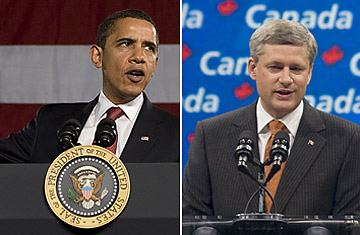
(L to R) Canadian Prime Minister Stephen Harper and President Barack Obama.
President Barack Obama is in Ottawa today for a private lunch with Prime Minister Stephen Harper, and the North-American economy is sure to be front and center. A softer "Buy American" provision in Obama's stimulus package that honors existing trade agreements such as NAFTA is sure to be discussed, as is the ongoing bailout of the North-American auto industry, which has deep roots in southern Ontario.
However the topic Obama might like to explore more than any other during the few hours he has with Harper — one with perhaps the most far-reaching consequences for U.S. recovery — is the Canadian prime minister's unprecedented spending to strengthen Canadian banks and keep credit flowing in the economy. (See the top 10 financial collapses of 2008.)
When earlier this year Harper unveiled his 2009 budget, he agreed to purchase an additional $50 billion in government-insured mortgages from Canada's major banks, bringing the total since the program was announced late last year to C$125 billion. Indeed the country's minority Conservative government has staked its political fortunes on the so-called Extraordinary Financing Framework (EFF), intended to counter the credit crunch by providing up to C$200 billion in credit for consumers and businesses. (Read "Canada Faces Recession — and a Political Crisis Too.")
The trouble is that since the pump-priming EFF was launched with an initial purchase of C$25 billion in government-backed mortgages in October 2008, there is nothing to suggest it has made any progress toward achieving its stated objectives. To be fair, about C$40 billion has been spent to date, but Canadian banks are just sitting on the new cash like the proverbial goose. "There is no evidence of more credit becoming available," says analyst Michael Goldberg with Toronto-based Desjardins Securities Inc. "In fact loan growth in the economy is slowing."
At first glance Ottawa's C$125 billion pales in comparison to the $1-trillion "bad bank" being contemplated by Obama to jump-start lending in the U.S.; however, accounting for differences in size between the two economies, the figures are nearly identical. If Canadian banks, ranked best capitalized in the G7 according to the Geneva-based World Economic Forum, are sitting on massive cash injections to healthy balance sheets, what can Obama expect from U.S. banks?
In Canada, the Harper government is purchasing good assets from financial institutions, including TD Bank Financial Group and Royal Bank of Canada, with a low probability of default, and does not expect EFF to cost taxpayers a single penny.
The same is not true south of the border. Under the best-case scenario in the U.S., unsteady financial institutions will need to off-load toxic assets to Washington's "bad bank" in order to start rebuilding balance sheets. Others, like Citigroup and Bank of America, that are teetering on the brink of insolvency will need new capital just to remain on life support. (See 25 people to blame for the financial crisis.)
As a result, it's unlikely that any of the $1 trillion Obama wants for his "bad bank" will be turned into credit that helps revive business and consumer spending. The main reason is that the North-American economy might be stuck in a classic liquidity trap, first witnessed during the Dirty Thirties when banks began hoarding newly created liquidity as insurance against a further downturn. "The fact is that since the failure of Lehman Brothers every bank in the world has been concerned with beefing up capital to survive the next few years," says Lawrence Booth, a finance specialist at the University of Toronto's Rotman School of Management.
The Canadian experience with EFF reinforces the U.S. experience with TARP: government loses control of stimulus money once it falls into the hands of recipients. Obama needs to be realistic about what the "bad bank" can accomplish — namely relieving banks of some junk assets at considerable cost to the taxpayer. It won't jump-start consumer lending — at least not in the foreseeable future if the lesson of Prime Minister Stephen Harper's experience is anything to go by.
